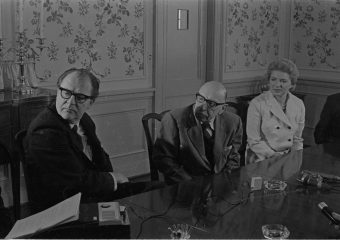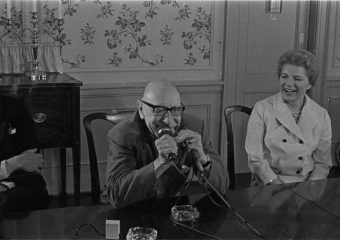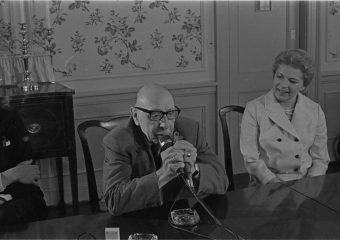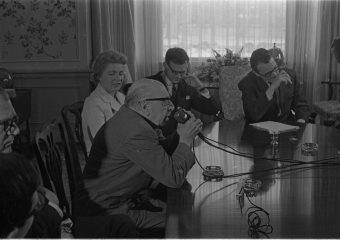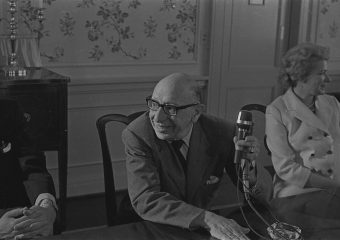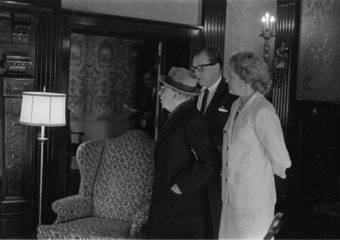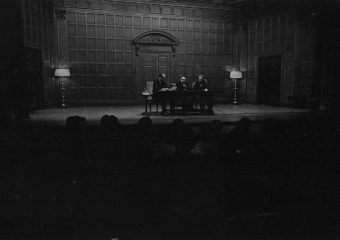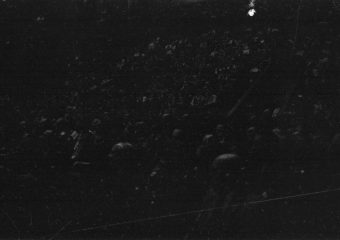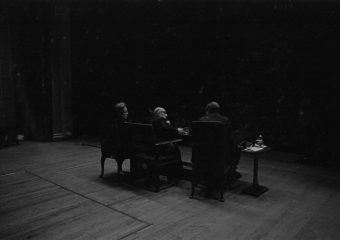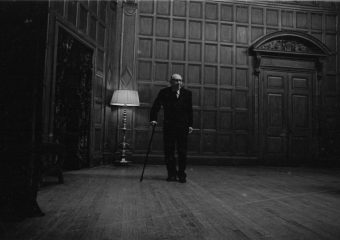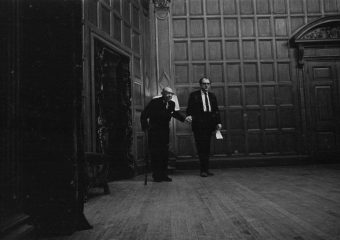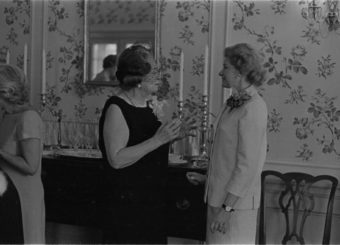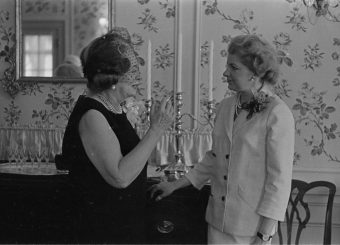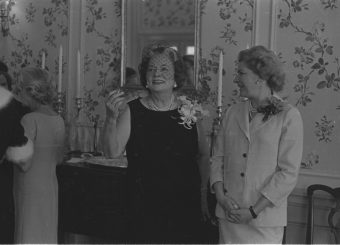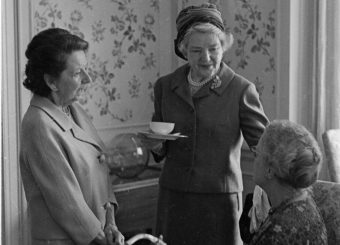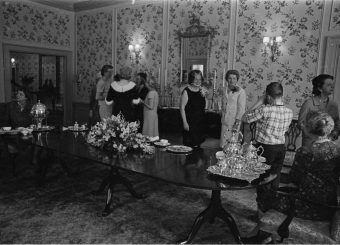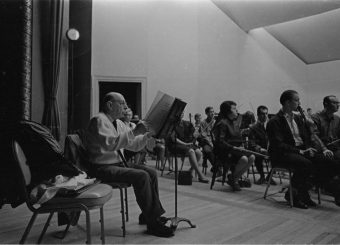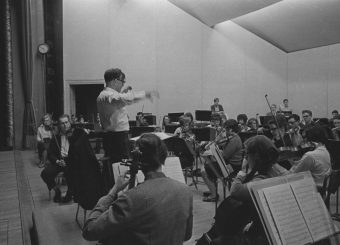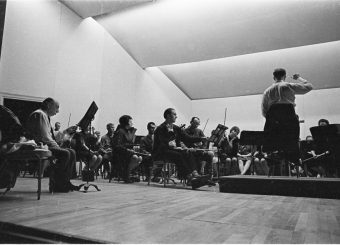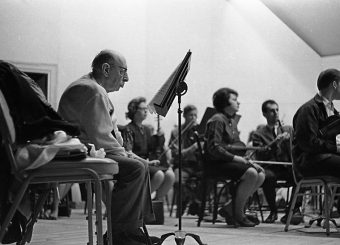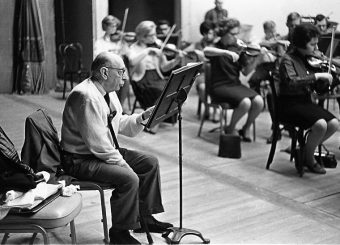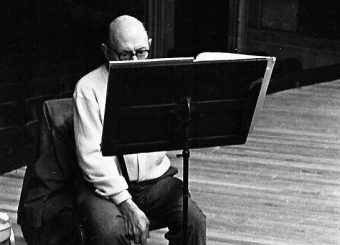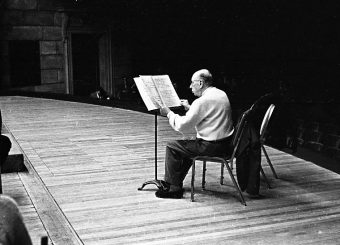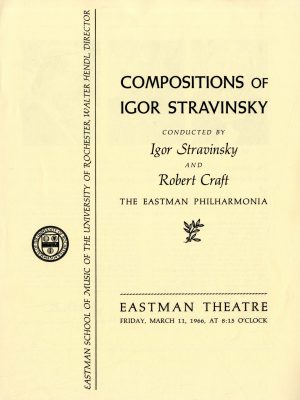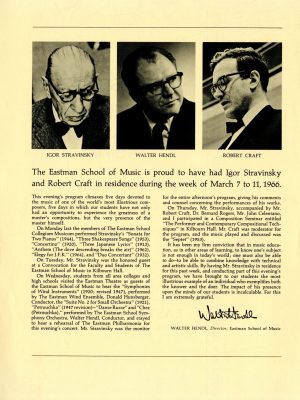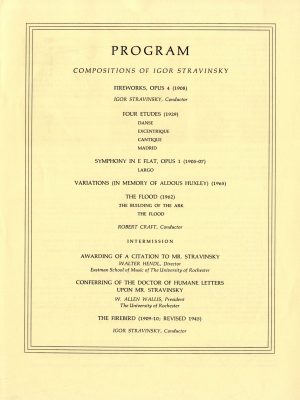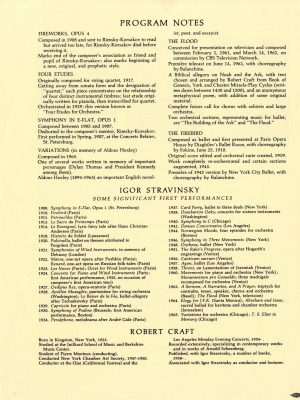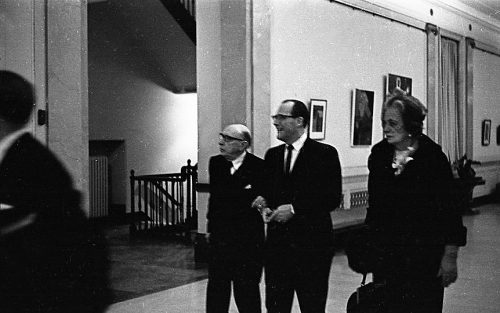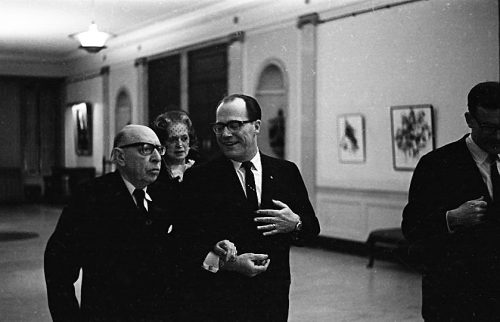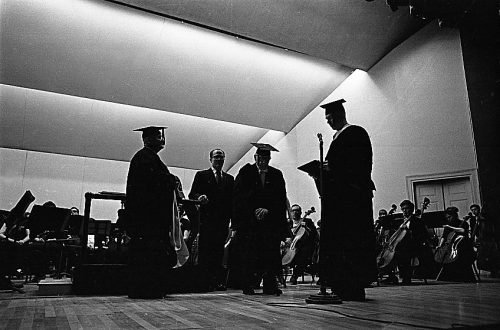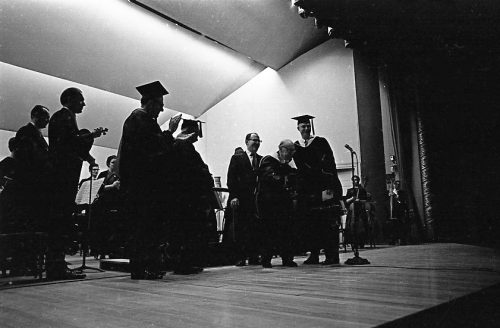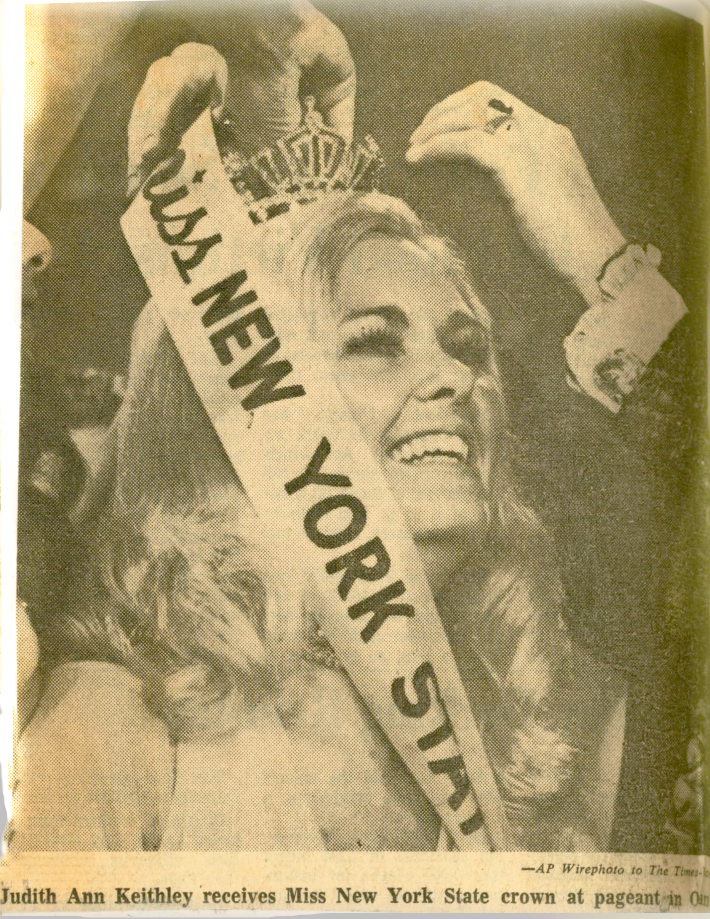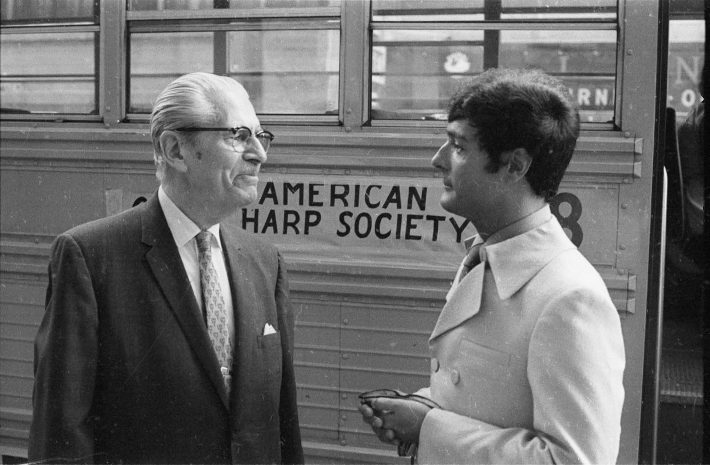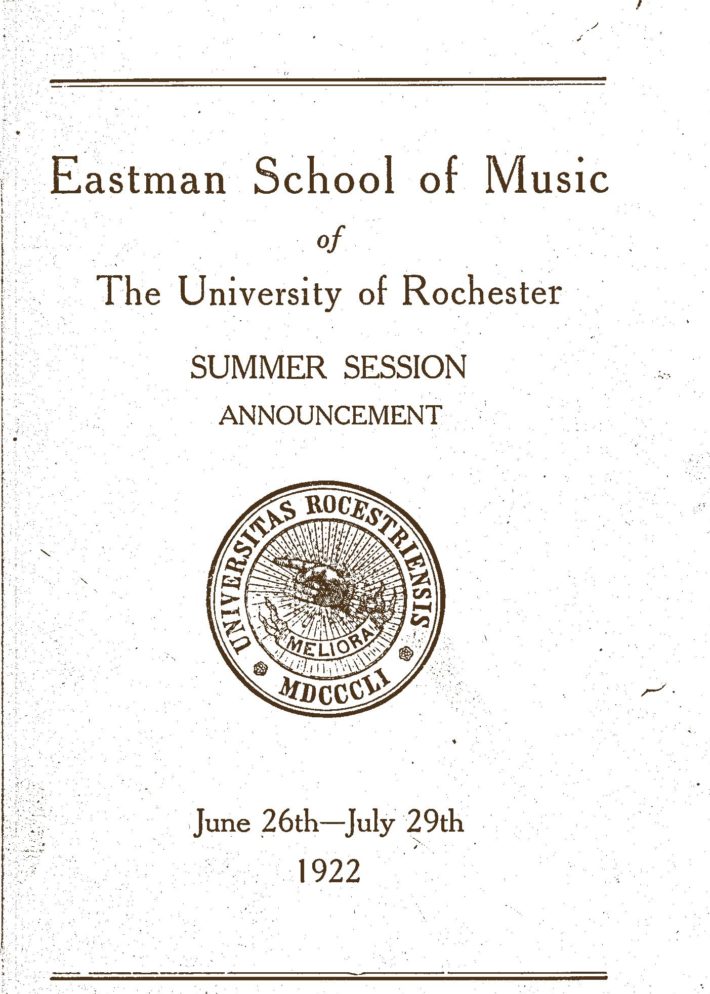1966: “Stravinsky Week” at Eastman
Fifty seven years ago this week, five days in March, 1966 were officially known as “Stravinsky Week” at the Eastman School of Music, when composer Igor Stravinsky (1882-1971) was in residence by invitation of Director Walter Hendl, who had known the composer personally for numerous years.[1] Mr. Hendl later described having conceived the Stravinsky residency “with a view toward bringing Eastman students into direct contact with the outstanding factors in today’s musical world” and he continued, “I have always felt there is real value in any encounter with a creative force. The phenomenon that is Stravinsky, of course, is entirely unique, and this was quite an encounter.”[2] To that end, the week’s events were designed to enable quality interaction between composer and Eastman School community in meaningful ways. Professor Donald Hunsberger, then-chairman of the Eastman School Ensembles department, was chairman of the special Stravinsky Week Committee, the other members of which were Professors Charles Warren Fox, George Corwin, and Robert Gauldin. The week would conclude with a gala concert at which the University would confer an honorary doctorate on the composer.
All-media conference at Hutchison House on Monday, March 7th, 1966. Igor Stravinsky is flanked by Eastman School Director Walter Hendl and Mrs. Edith Hendl. Mr. Stravinsky’s assistant, composer Robert Craft, is also present. R63-12A, R63-13A, R63-14A, R63-16A, R63-21A, R63-35A (6)
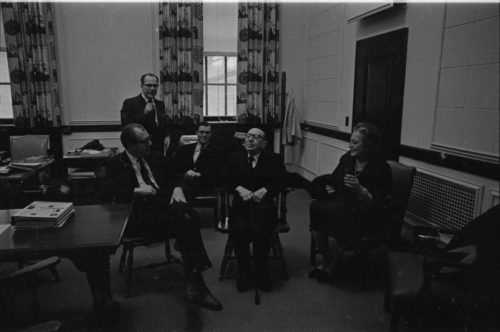
Visitation for faculty members and students on Tuesday, March 8th, 1966. Igor and Vera Stravinsky are joined on the stage of Kilbourn Hall by Walter Hendl. R68-6, R68-8, R68-10, R68-18, R68-21 (5)
It has frequently been said around the Eastman School that the Stravinsky residency represented another step in the Hendl Administration’s embrace of the musical world beyond American music. Throughout Howard Hanson’s long tenure, the Eastman School of Music had correctly been perceived as an institution where American music and the American composer were ardently championed. The many American Composers’ Concerts, and the annual Festivals of American Music (1931-1971) bore testimony to this. I myself have quipped more than once that during the Hanson years, one might appropriately have draped a banner reading “American music played here” on the Eastman School’s exterior. The cause of American music was a valid and worthy mission, and its advocacy at the Eastman School did not end with Hanson’s retirement. For one thing, the Festivals of American Music continued through 1971 with Hanson’s continuing administrative participation, and still today, the Howard Hanson Institute for American Music is instrumental in the commissioning of new works. The difference between the Hanson era and later is one of priority, or of balance; in the post-Hanson Eastman School, American music has taken its place as one creative entity within a broader vision of music. Under Director Hendl’s leadership there came a succession of high-profile events which brought the students and faculty of the Eastman School into direct contact with noteworthy international figures. The first had been in December, 1965 when Mr. Hendl had conducted the Western Hemisphere premiere of Dmitri Kabalevsky’s Requiem, opus 27 in a performance featuring a children’s chorus drawn from the Rochester City School District. (That same chorus would be re-branded the following year as the Eastman Children’s Chorus, and would remain active through the 1970s.) Roll forward to March, 1966, when a major composer would be in residency.
During the Eastman School’s Stravinsky Week, Mrs. Edith Hendl hosts a tea at Hutchison House in honor of Mrs. Vera Stravinsky. (Hutchison House, 930 East Avenue, was the official residence of the Eastman School Director for a period of several years.) Other guests included Professor Cecile Staub Genhart and Dean of Students Flora Burton, both of whom are captured in one of these shots. R64-9A, R64-14A, R64-16A, R64-18A, R65-2 (5)
In an open rehearsal in the Eastman Theater, the Eastman Philharmonia is led by guest conductor Robert Craft while guest composer Igor Stravinsky is seated on-stage to offer commentary and counsel. R65-26, R65-27, R65-30, R72-3, R72-4, R72-5, R72-6 (7)
Composer Stravinsky and his wife arrived in Rochester on Sunday evening, March 6th, having flown from Los Angeles via Chicago; their appointed accommodations were the downtown Sheraton Hotel (today the apartment building at 111 East Avenue). The following morning, Monday, March 7th, the composer met with media representatives in an all-media press conference at Hutchison House, 930 East Avenue, which at that time was the official residence of the Eastman School Director. The composer fielded questions from media representatives while seated before a microphone and flanked by his hosts Mr. and Mrs. Walter Hendl. One local newspaperman’s summary of the media conference described the composer as “simple, informal, friendly, slight of stature” and “with a face wreathed in smiles and eyes twinkling behind heavy glasses.”[3] Another press account noted that Stravinsky had refused to comment on the work of other contemporary composers, and had similarly declined to share or venture any thoughts as to the direction that music would take in the remaining years of the 20th century.[4] Still another press writer reported that when asked about the place of women in conducting and composing, the composer had answered, “That is not a woman’s profession.”[5] (!!!) Later that day, the composer’s wife Vera was the guest of honor when Mrs. Edith Hendl hosted a tea at Hutchison House. Madame Stravinsky (1889-1982), like her husband a Russian-born expatriate, was a former dancer who had long been active in the art world. In the company of Mrs. Hendl and other guests, she graciously answered questions from the press and spoke in particular of her love of books.[6]
On Monday evening, March 7th, Stravinsky was officially welcomed to the Eastman School with a Collegium Musicum concert in Kilbourn Hall featuring several of his chamber and vocal works. The following afternoon, on Tuesday, March 8th, there was a student-faculty convocation, essentially a visitation, in Kilbourn Hall during which the composer took questions from the audience. He was joined on the stage by Mr. Hendl and by his wife.
On the afternoon of Wednesday, March 9th, students from outside the Eastman School were welcomed to attend what had been promoted as a College and Secondary School Visitation in the Eastman Theater. At this event, the Eastman Wind Ensemble performed the Symphonies of Wind Instruments (1947 revision) under Dr. Hunsberger’s direction; the Eastman School Symphony Orchestra performed the Suite No. 2 for Small Orchestra (1921) and two excerpts from the ballet Petrushka (1947 revision), conducted by Mr. Hendl; and then followed an open rehearsal of sections from the musical play The Flood (1962) in which the Eastman Philharmonia was conducted by Stravinsky’s assistant, composer Robert Craft (1923-2015). Throughout the rehearsal Mr. Stravinsky was seated on the stage as an active participant, following his score and offering critical commentary.
On the afternoon of Thursday, March 10th, Kilbourn Hall was the venue for a seminar billed as “The Performers and Contemporary Compositional Techniques” which took the form of a panel discussion moderated by Mr. Stravinsky’s assistant, Mr. Craft. The panelists were Mr. Hendl, composer Stravinsky, Professor Bernard Rogers, and Professor John Celentano. The panel discussion was followed by a performance of Stravinsky’s Septet, performed by six Eastman School students who had been prepared by Professor Robert Gauldin.
Stravinsky Week concluded on Friday evening, March 11th when the Eastman Philharmonia gave a gala concert of music by Stravinsky, conducted by the composer himself and by Mr. Craft (the program is displayed here). At the concert’s intermission, UR President W. Allen Wallis conferred on Stravinsky the honorary degree of Doctor of Humane Letters. Director Hendl read the citation which accompanied the honorary degree; it is worth quoting in full:
“Although many men are acclaimed by their contemporaries, only a few of them hear the mark of lasting fame. Igor Stravinsky is among those few. His cultural achievements—as composer, conductor, and artist—will always be cited as unexcelled by any figure of this century.
“Born in Russia near St. Petersburg, in 1982, he studied in his youth with Rimsky-Korsakov, already showing the genius that still continues to grow. The brilliance of his early successes made its impact on this side of the Atlantic long before his first visit to America in 1925; and the nation takes pride in his choice of the United States as his home since 1939.
“A citizen of this country now, he is also a citizen of the cultural world that is unbounded by space and time. His increasing and unceasing influence in shaping the progress of music in the twentieth century is everywhere apparent in modern composition: in polytonality, serial technique, and neo-Baroque music, among other things.
“Bringing to his own creative activities such diverse influences as folklore, church rites, eighteenth century reserve, and unbridled jazz, he has composed in, and had his effect upon, almost every musical form and medium.
“The world is fortunate to have the thought of this man of genius recorded in a series of Harvard lectures and the four books he has written in recent years. The Eastman School of Music of the University of Rochester pays homage to Igor Stravinsky as one of the immortals of music and offers him the degree, Doctor of Humane Letters, as the symbol of its veneration.”[7]
► Printed program, gala concert, March 11th, 1966 (4 pages)
Altogether, the Stravinsky Week initiative—boasting the presence of an internationally acclaimed composer, and enabling substantive engagement with that composer—represented a mighty coup for the Eastman School, bringing at once prestige and pedagogical meaning. Significantly, the composer was later quoted as saying, “Only a few weeks ago I heard the Eastman School orchestra [i.e., the Philharmonia] play to perfection, on a minimum of rehearsal, some of my most difficult later music, including parts of The Flood, which at least one renowned professional orchestra could not manage after a week of rehearsals and a dozen performances. The flexibility of the young versus the rigidity of the routiniers is an old theme, of course, but you can hardly imagine the pleasure this student orchestra gave me.”[8]
As regards archival documentation of Stravinsky Week, the extant content includes press clippings, photographs (most by Louis Ouzer), printed programs, and a feature article published in the very first issue of Notes from Eastman (front cover of that issue displayed here). The extant audio archival content is particularly rich, consisting of the master tapes of the week’s events: the concerts by both the Collegium Musicum and the Eastman Philharmonia; the March 8th convocation and the March 10th composition seminar; the March 9th visitation and following open rehearsal; and an additional rehearsal of Stravinsky’s music by the Eastman Philharmonia. Much of this audio content is already represented in CD service copies at the Sibley Music Library’s Recordings/Reserves department. If there should happen to be sufficient interest, we will execute new digital transfers of the content for streaming via the Ampache interface. Email me!
On the evening of the Eastman Philharmonia concert, Concert Manager Mr. Robert Sattler escorts composer Igor Stravinsky and his wife Vera. R72-15, R72-16(2)
On the occasion of the Eastman Philharmonia concert that concluded the Eastman School’s Stravinsky Week, UR President W. Allen Wallis confers the honorary degree Doctor of Humane Letters on the guest composer. R85-15, R85-28 (2)
[1] “Stravinsky, in person, with his ‘Firebird’” by Harvey Southgate. Rochester Democrat & Chronicle, March 6, 1966. Rochester Scrapbooks, Sibley Music Library.
[2] “Stravinsky Week” in Notes from Eastman, vol. I, no. 1 (September 1966), p. 3. Notes from Eastman was the forerunner publication to Eastman Notes; it began its run in a small format and in entirely black and white print.
[3] “Stravinsky unmoved by electronic music” by Harvey Southgate. Rochester Democrat & Chronicle, March 8, 1966. Rochester Scrapbooks, Sibley Music Library.
[4] “’Heart’ old hat to Stravinsky” by Hamilton B. Allen. Rochester Times-Union, March 7, 1966. Rochester Scrapbooks, Sibley Music Library.
[5] “Stravinsky: impressions of the Maestro” by Judith Kerman. Campus Times, March 15, 1966. Rochester Scrapbooks, Sibley Music Library.
[6] “Stravinskys get around” by Lynne Godwin. Rochester Times-Union, March 8, 1966. Rochester Scrapbooks, Sibley Music Library.
[7] “Igor Stravinsky receives honorary degree from UR.” Campus Times, March 15, 1966. Rochester Scrapbooks, Sibley Music Library.
[8] The composer’s remarks were initially printed in The New York Review of Books, issue of May 11th, 1966, and were subsequently reprinted elsewhere, including Notes from Eastman.


